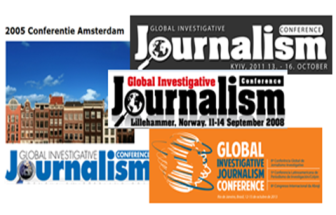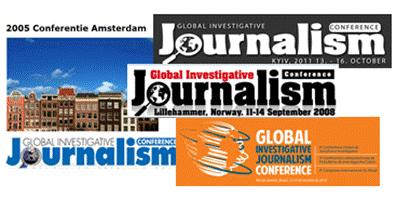 International investigative journalists are working under threats – ranging from physical brutality to government prosecutions – yet their craft flourishing in emerging democracies and long-established Western newsrooms, according to a panel of four veteran reporters who explored the state of global muckraking on a GIJC13 panel Saturday morning.
International investigative journalists are working under threats – ranging from physical brutality to government prosecutions – yet their craft flourishing in emerging democracies and long-established Western newsrooms, according to a panel of four veteran reporters who explored the state of global muckraking on a GIJC13 panel Saturday morning.
While reporters from Latin America, South Africa, and the Middle East heralded media exposes of government corruption and social abuses conducted by media groups, the panel also highlighted the challenges and opportunities brought about by technology.
And, all seemed in agreement, to meet those challenges and opportunities media organizations must invest in education.
Faced with physical threats, “Do you give up? Never, never give up,” said Gustavo Gorriti of non-profit investigative group IDL-Reporteros, Peru. “What can you do? You can use proper security measures (and) allocate resources: train, train, train journalists to resort to best practices.”
“Jordan’s World of Silence,” a documentary cited by Rana Sabbagh with Arab Reporters for Investigative
![]() Journalism in Jordan, highlighted the dangers faced by young reporters working undercover to reveal the abuses – sexual, verbal and psychological – imposed on kindergarten children,.
Journalism in Jordan, highlighted the dangers faced by young reporters working undercover to reveal the abuses – sexual, verbal and psychological – imposed on kindergarten children,.
And Mzilikazi wa Afrika, with the Sunday Times of ![]() South Africa, spoke of his own arrest and threats made against him for exposing a corrupt police commissioner.
South Africa, spoke of his own arrest and threats made against him for exposing a corrupt police commissioner.
Educating and training journalists to deal with new technologies came into sharp relief in the past couple of years with the WikiLeaks revelations and, more recently, the NSA leaks provided by former NSA contractor Edward Snowden.
“It’s not an exaggeration to say that in the last three years there has been a new era in investigative journalism” brought about by “mass digital leaking and mass corporate (cooperation) of journalism,” said David Leigh of The Guardian, which worked cooperatively with The New York Times and several other media outlets to digest and disseminate those vast data dumps.
“What WikiLeaks showed … was a shift in technology which meant a shift in investigative journalism,” Leigh said. “So we had to learn how to process massive amounts of information, how to search that information and how to make stories from that information.”
Those experiences underscore the need for learning new skills.
“The common thread of all these database leaks is the global significance, which means we must: first, get sophisticated about searching these databases and, second we must collaborate on an international scale” with other interested media sites, said Leigh.
Asked how to organize or execute huge international investigations, speakers again noted the need to work cooperatively with other outlets that might otherwise be competitors and using the assets of NGOs and not-for-profit, such as the International Consortium of Investigative Journalists (ICIJ).
The ICIJ Global Off-Shore Money Maze, a database of assets hidden by hundreds of international crooks, corporate moguls, and government officials, was one example noted by panelists.
“To get the best out of these stories, you have to extract the international significance,” which requires sharing with an international set of journalists, said Leigh.

